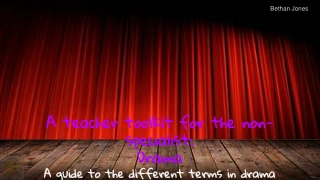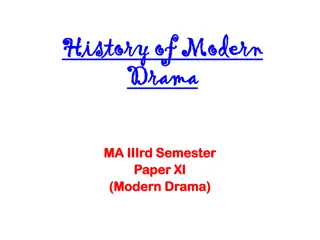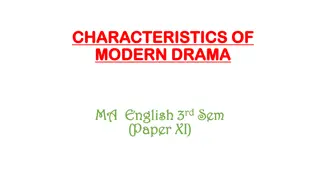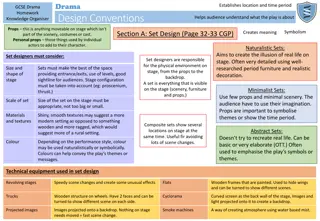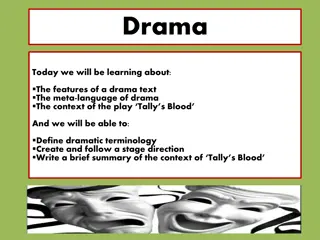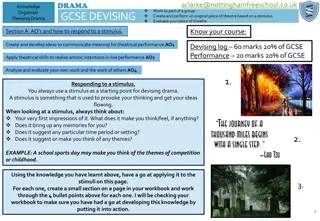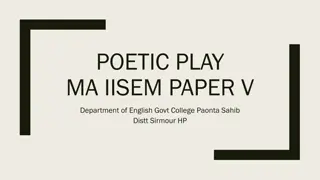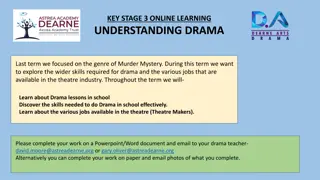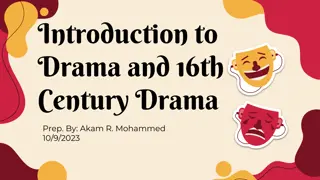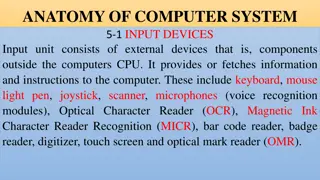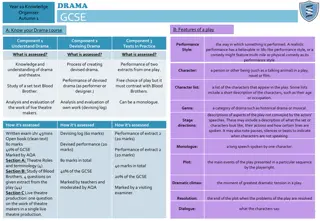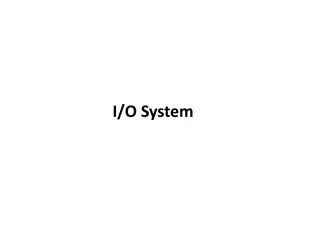Explore Literary Devices in Drama
Delve into the world of drama with an examination of various literary devices such as foils, foreshadowing, similes, metaphors, conflicts, protagonists, antagonists, soliloquies, monologues, asides, irony, dramatic irony, blank verse, iambic pentameter, alliteration, and puns.
Download Presentation

Please find below an Image/Link to download the presentation.
The content on the website is provided AS IS for your information and personal use only. It may not be sold, licensed, or shared on other websites without obtaining consent from the author. Download presentation by click this link. If you encounter any issues during the download, it is possible that the publisher has removed the file from their server.
E N D
Presentation Transcript
Foil A character with qualities that are in sharp contrast to another character, thus emphasizing the qualities of each.
Foreshadowing A hint about what is to come in literature or what the outcome of the conflict will be.
Simile/Metaphor Simile Comparison using like or as o Her face is like a summer s day Metaphor Comparison not using like or as o I am the East, and Juliet is the West
Conflict External o Man vs. Man o Man vs. Nature o Man vs. Society Internal o Man vs. Self
Protagonist/Antagonist Protagonist Main character who is in conflict with the antagonist and whom the audience is intended to most identify with. Antagonist Character that represents the opposition against which the protagonist must contend.
Soliloquy/Monologue/Aside Soliloquy Long speech given by a character while alone on stage to reveal his or her private thoughts or intentions to the audience. Monologue Character speaks at length to the audience or another character without the expectation of a response. Aside Character s brief, quiet remark to the audience or another character that no one else on stage is supposed to hear.
Irony/Dramatic Irony .Irony Contrast between appearance and reality Dramatic Irony Audience or reader knows something the other characters do not know
Blank Verse Written like poetry but tells a story Free-flowing rules - doesn t have a rhyme scheme or set number of lines
Iambic Pentameter Lines have a rhythm to them 10 syllables Pattern of stressed and unstressed syllables He JESTS at SCARS that NEV er FELT a WOUND But SOFT! what LIGHT through YON der WIN dow BREAKS?
Alliteration/Pun Alliteration Group of words that begin with the same letter or sound o desire doth in his deathbed lie Pun Play on words o "Vandals destroyed many road signs. They really pulled out all the stops."
Ballad: a poem or song narrating a story in short stanzas. Traditional ballads are typically of unknown authorship, having been passed on orally from one generation to the next as part of the folk culture. Sonnet: a poem of fourteen lines using any of a number of formal rhyme schemes, in English typically having ten syllables per line.
Sonnet 130 My mistress eyes are nothing like the sun; Coral is far more red than her lips red; If snow be white, why then her breasts are dun; If hairs be wires, black wires grow on her head. I have seen roses damask d, red and white, But no such roses see I in her cheeks; And in some perfumes is there more delight Than in the breath that from my mistress reeks. I love to hear her speak, yet well I know That music hath a far more pleasing sound; I grant I never saw a goddess go; My mistress, when she walks, treads on the ground: And yet, by heaven, I think my love as rare As any she belied with false compare.
Ode: a lyric poem in the form of an address to a particular subject, often elevated in style or manner and written in varied or irregular meter. Pindaric Ode: Ode to Aphrodite - Sappho (c. 630-570 B.C.) Deathless Aphrodite, throned in flowers, Daughter of Zeus, O terrible enchantress, With this sorrow, with this anguish, break my spirit Lady, not longer! Hear anew the voice! O hear and listen! Come, as in that island dawn thou camest, Billowing in thy yoked car to Sappho Forth from thy father's Golden house in pity!



